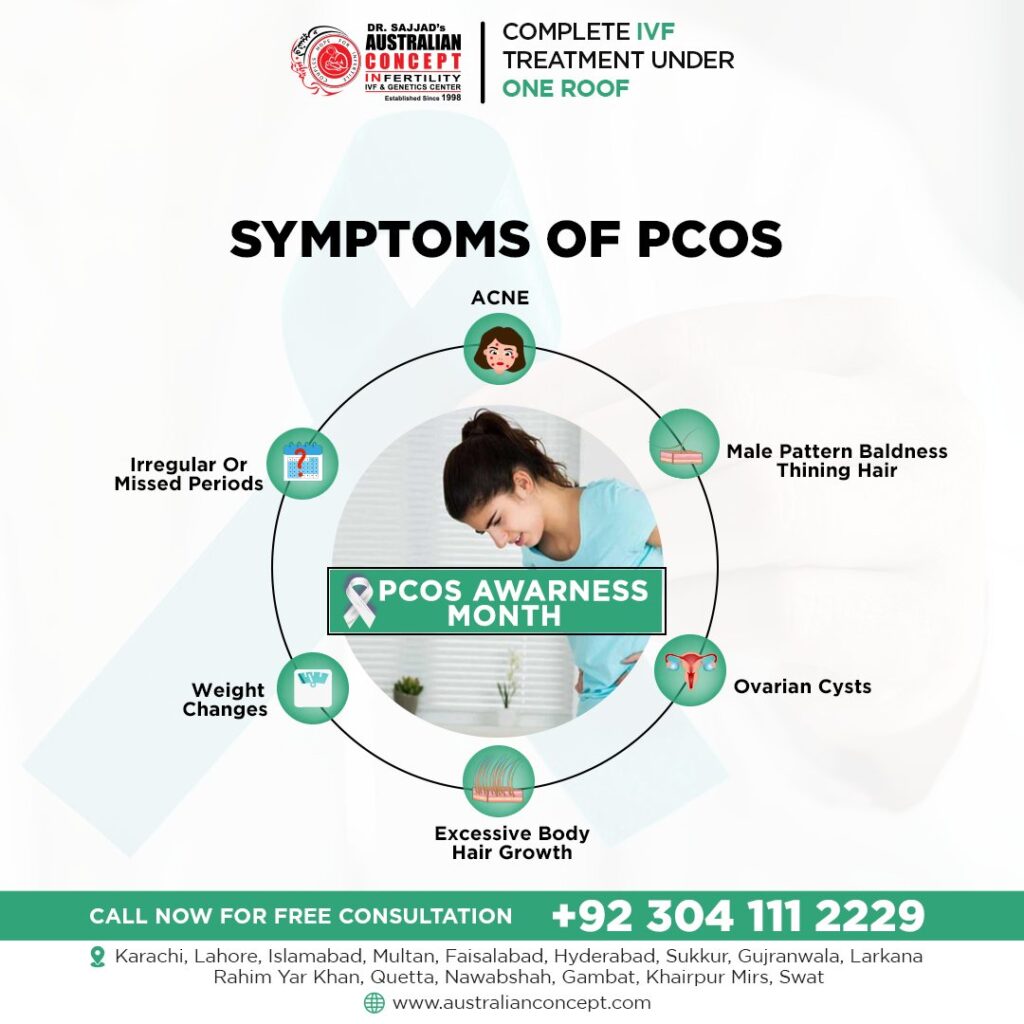Polycystic Ovary Syndrome (PCOS) is a common hormonal disorder that affects women of reproductive age. It is characterized by a range of symptoms and can have significant implications for reproductive health. Understanding PCOS and its symptoms is essential for early diagnosis and effective management, particularly for women considering IVF treatment or seeking help from a fertility clinic.
What is PCOS?
It is a hormonal disorder that disrupts normal ovulation and can lead to various health issues. The exact cause of PCOS is not fully understood, but factors such as genetics, insulin resistance, and inflammation may play a role. Women with this often experience an imbalance in reproductive hormones, leading to a variety of symptoms.
Common Symptoms of PCOS
- Irregular Menstrual Cycles: One of the most common symptoms of PCOS is irregular or absent menstrual periods. Women may experience cycles that are longer than 35 days or may skip periods altogether.
- Excess Androgen Levels: Elevated levels of androgens, the male hormones present in women, can lead to symptoms such as acne, oily skin, and excessive hair growth (hirsutism). This can occur on the face, chest, and back, causing distress for many women.
- Polycystic Ovaries: Women with this may have enlarged ovaries that contain small fluid-filled sacs (follicles). These cysts are often detected through an ultrasound but do not always cause symptoms.
- Weight Gain: Many women with PCOS experience weight gain or have difficulty losing weight. This can exacerbate insulin resistance and hormonal imbalances, leading to a cycle that is challenging to break.
- Insulin Resistance: Insulin resistance is common in women with PCOS, which means their bodies do not use insulin effectively. This can lead to higher insulin levels, weight gain, and an increased risk of developing type 2 diabetes.
- Thinning Hair: Some women may notice thinning hair or male-pattern baldness due to hormonal changes. This can impact self-esteem and body image.
- Skin Changes: Women with PCOS may develop dark patches of skin, known as acanthosis nigricans, typically in areas such as the neck, groin, and underarms.
- Fertility Issues: PCOS is one of the leading causes of infertility in women. Irregular ovulation can make it difficult to conceive, leading many women to seek assistance from an IVF center in Karachi or other fertility clinics.

Long-term Health Implications
Women with PCOS face not only reproductive challenges but also long-term health risks, including:
- Type 2 Diabetes: Due to insulin resistance, women with PCOS are at a higher risk of developing type 2 diabetes.
- Heart Disease: PCOS may increase the risk of heart disease due to factors such as high blood pressure, elevated cholesterol levels, and obesity.
- Endometrial Cancer: Irregular menstrual cycles can lead to an increased risk of thickening of the uterine lining, which raises the risk of endometrial cancer.
- Mental Health Issues: Women with PCOS may experience depression, anxiety, and low self-esteem due to the physical symptoms and fertility challenges associated with the disorder.
Diagnosis of PCOS
Diagnosing PCOS typically involves a thorough medical history, physical examination, and specific tests. Healthcare providers may perform blood tests to check hormone levels and an ultrasound to examine the ovaries.
To be diagnosed with it, a woman typically must meet at least two of the following criteria:
- Irregular or absent menstrual cycles.
- Elevated androgen levels, either through blood tests or physical symptoms.
- The presence of polycystic ovaries on ultrasound.
Management and Treatment Options
While there is no cure for this, various treatment options can help manage symptoms and reduce health risks:
- Lifestyle Changes: A balanced diet and regular exercise can help manage weight, improve insulin sensitivity, and regulate menstrual cycles. Even a modest weight loss of 5-10% can significantly impact symptoms.
- Medications: Hormonal contraceptives, such as birth control pills, can help regulate menstrual cycles and reduce androgen levels. Metformin may also be prescribed to improve insulin sensitivity.
- Fertility Treatments: Women struggling to conceive may consider fertility treatments. Options include medications to stimulate ovulation or assisted reproductive technologies like IVF. Consulting a fertility clinic can provide tailored solutions.
- Counseling and Support: Mental health support can be beneficial for managing the emotional challenges associated with it. Support groups and counseling can help women cope with symptoms and improve their well-being.
Conclusion
PCOS is a complex condition that affects many women worldwide. Recognizing its symptoms is crucial for early diagnosis and effective management. By understanding and its implications, women can take proactive steps toward better health and reproductive outcomes.
Whether seeking help for managing symptoms or considering IVF treatment, women should consult healthcare professionals for guidance tailored to their individual needs.


